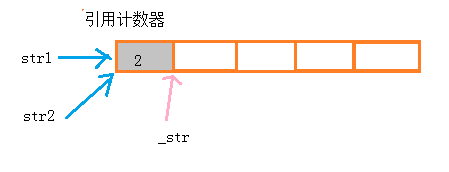由於淺拷貝使多個對象共用一塊內存地址,調用析構函數時導致一塊內存被多次釋放,導致程序奔潰。
實現string類的時候通常顯示的定義拷貝構造函數和運算符重載函數。
由於釋放內存空間,開闢內存空間時花費時間,因此,在我們在不需要寫,只是讀的時候就可以不用新開闢內存空間,就用淺拷貝的方式創建對象,當我們需要寫的時候纔去新開闢內存空間。這種方法就是寫時拷貝。
在構造函數中開闢新的空間時多開闢4個字節的空間,用來存放引用計數器,記錄這快空間的引用次數。
#include<iostream>
#include<stdlib.h>
using namespace std;
class String
{
public:
String(char *str = "")
:_str(new char[strlen(str) + 5])
{
*(int *)_str = 1;
_str += 4;
strcpy(_str, str);
}
~String()
{
if (_str != NULL)
{
_Release();
}
}
String(const String& str)
{
_str = str._str;
++_GetRefCount();
}
String& operator=(const String& str)
{
if (this != &str)
{
_Release();
_str = str._str;
++ _GetRefCount();
}
return *this;
}
char& operator[](int index)//寫時拷貝
{
if (_GetRefCount()>1)//當引用次數大於1時新開闢內存空間
{
--_GetRefCount();//原來得空間引用計數器減1
char *str = new char[strlen(_str) + 5];
strcpy(str+4, _str);
_str = str+4;
_GetRefCount()++;
}
return _str[index];
}
friend ostream& operator<<(ostream& output, const String& str)
{
output << str._str;
return output;
}
private:
int& _GetRefCount()
{
return *(int *)(_str - 4);
}
void _Release()
{
if (--_GetRefCount() == 0)
{
delete[] (_str-4);
}
}
private:
char *_str;
};

